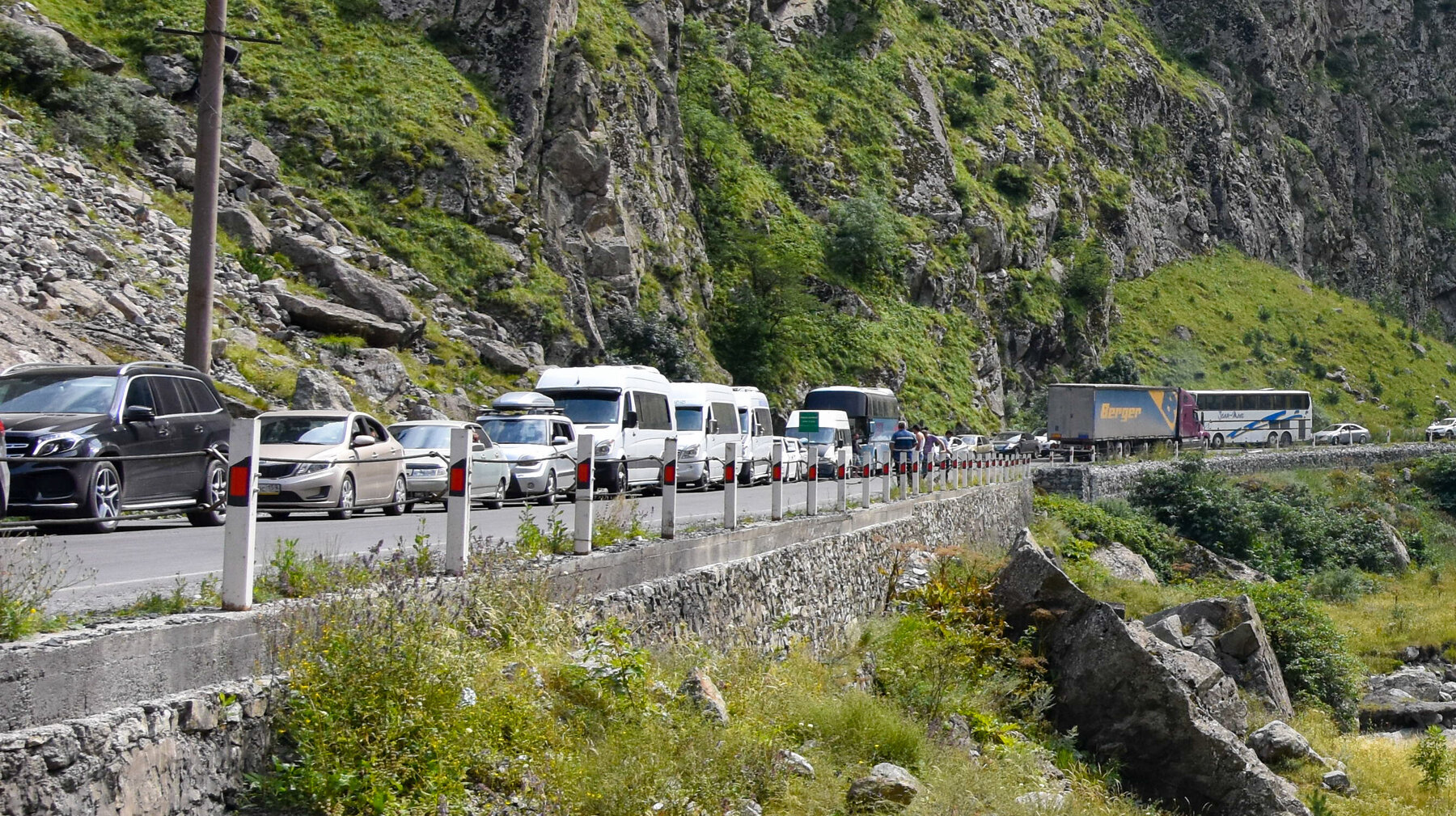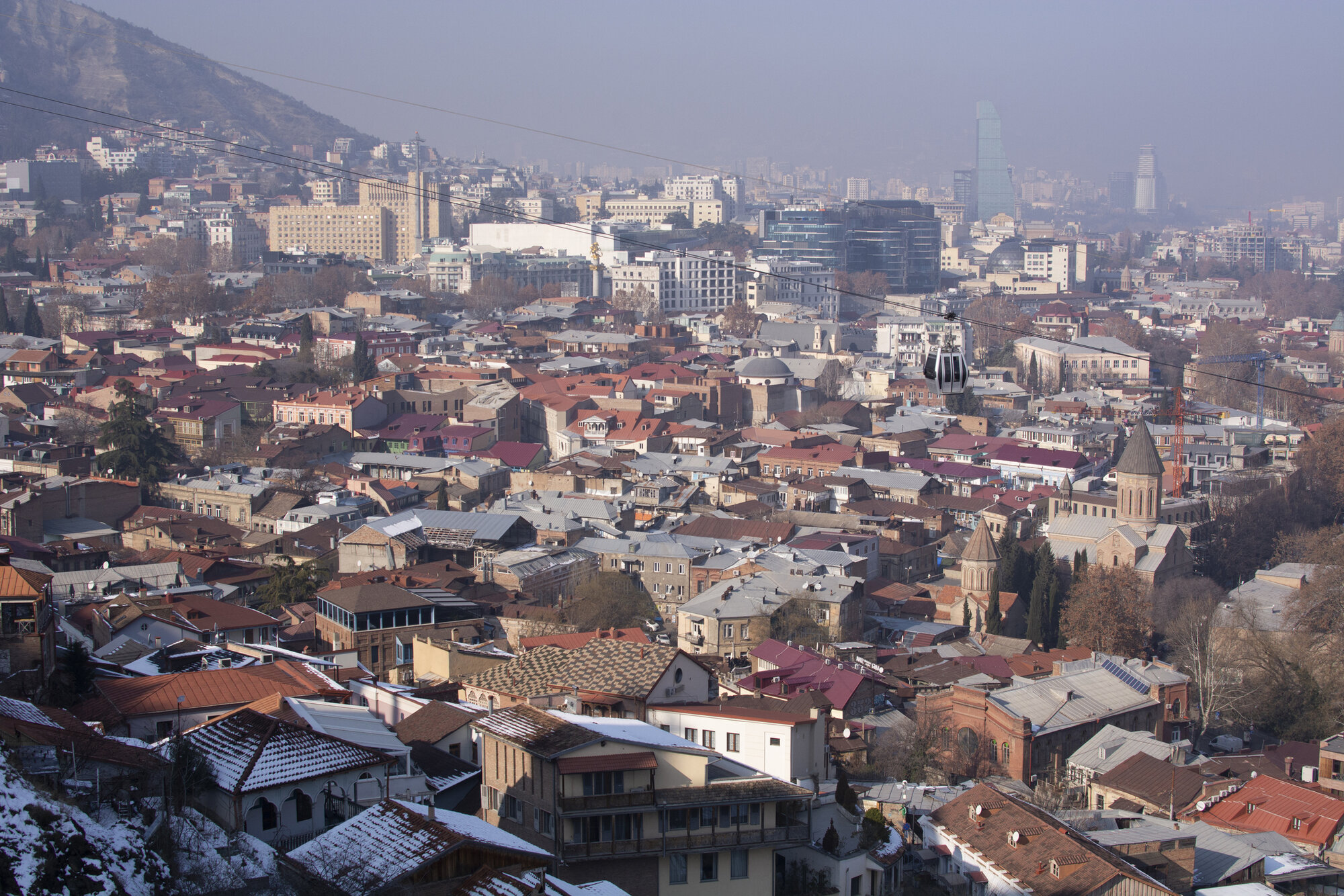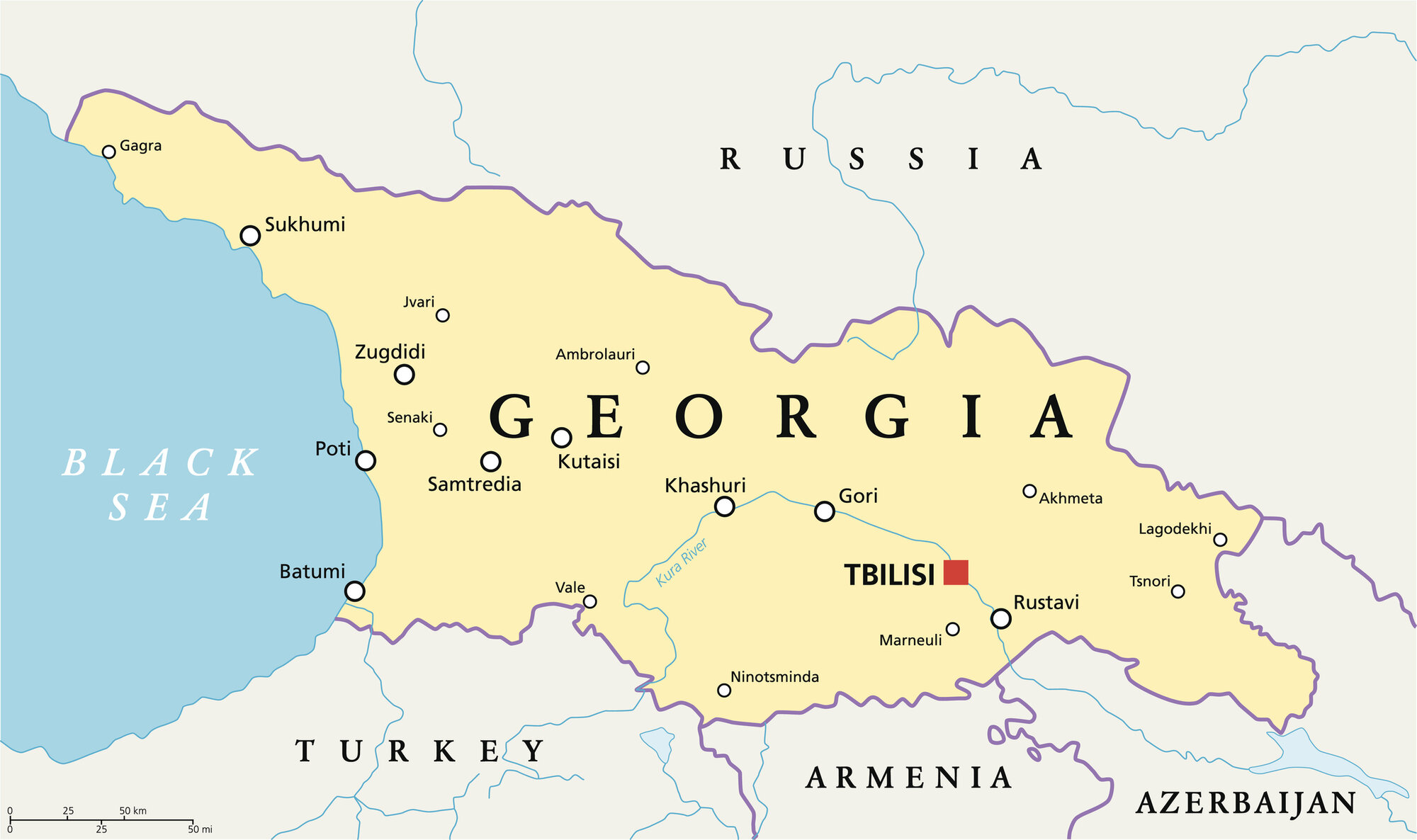Russians fleeing mobilisation are putting huge pressure on Georgia’s citizens, in a country already wary of its neighbour’s might.
Late last September, small groups of people emerged every few minutes from the border at the Larsi checkpoint in the northern part of Georgia. "Putin has lost his marbles," said Fillip Morozov, 34, an industrial climber from Moscow, rolling his bicycle. "He is not going to stop, and it frightens me".
Just a few weeks before, Morozov was cleaning the windows on the skyscrapers in Moscow. Now he is among more than 50,000 Russian citizens, mostly men, who have arrived in the South Caucasus republic. He fled because Russia’s president, Vladimir Putin, has been "partially" mobilising his population in an attempt to change the course of the war in Ukraine. The influx has been putting huge pressure on the lives of Georgians.
More than 50,000 Russian citizens have fled to Georgia
Morozov's face was tanned, his long hair stuck to his sweaty forehead, the eyes behind the glasses red. His trip to the border took more than four days: first, a plane to Sochi, then a train to Vladikavkaz and finally, a two-day wait to cross the border. "It could be worse," he said, explaining that the military notice which obliges him to join the army had already arrived at his apartment. He talked of long queues and corruption on the Russian side of the border.
That week, almost 6,000 cars and trucks waited on the Russian side, a line-up more than 12 miles long. Morozov said that many were forced to pay local police to get through faster. I asked what was next for him. "First Tbilisi, then let's see," he replied. Ten yards away from Morozov, a young man stood behind a camera, taking pictures of the minivan drivers surrounding the migrants and offering them rides to Tbilisi or Yerevan, the capital of neighbouring Armenia.
Fyodor, who preferred not to disclose his last name, is a documentary filmmaker from Saint Petersburg. He arrived in Georgia at the beginning of March, with the first wave of Russian migration. Now he was making a film about others following his path. "Since I arrived I've thought a lot about why Putin does this," he said. "But I still do not understand; the war hasn't brought him any benefits."
"Putin has lost his marbles"
Soon after Russia invaded Ukraine, many young Georgians felt the consequences. According to data from the Ministry of Internal Affairs of Georgia, by the end of October, 120,000 Russians had relocated to Georgia, causing rents to skyrocket all over the country.
Rental contracts in Georgia usually do not protect tenants against price increases, which allows landlords to take advantage of Russian immigration. According to one study by TBC Capital, a local capital market advisory company, rents in Tbilisi have increased by 60 per cent compared to last year. Hundreds of students are now desperately in search of affordable flats. "The landlords prefer Russians, because they pay more," said Shorena Bidzinashvili, a 29-year-old who lives in the small town of Kvareli, in the eastern part of Georgia. Shorena used to work in a local grocery store, but is trying to move to Tbilisi. She hopes to earn more and pay for her younger sister's higher education. The two women have been looking for an apartment for almost four weeks now. They can pay $250 a month, but this is now barely enough. "Landlords ask $200 to $250 for places which look like burrows, with broken furniture and water dripping from the pipes," Bidzinashvili said.
But not everyone agrees that the Russians are to blame for the lack of accommodation. One hundred miles away from Larsi, 21-year-old philosophy student Saba Qerqadze was sitting on the bench in front of Tbilisi State University. Founded in 1918, it is Georgia’s oldest and biggest higher educational institution.
Housing problems have existed since before the wave of Russian immigration
Qerqadze and his friends protested for more than five months to demand a new student dormitory, which the university's administration ignored. A new dormitory would solve the housing problem for the students for the upcoming decades, he said, noting that students have had housing problems long before the Russian immigration.
Last autumn, for the first time since the beginning of the pandemic, students returned to classrooms. Some didn't make it, says Saba. He explains that, every year, hundreds of students are forced to freeze their status because they have nowhere to live. "The housing problem has existed for years. None of the governments had the vision, nor the policies, to fix it."
Tako Vasadze, a local real estate agent, explained that for many of her former clients "it's almost impossible" to rent an apartment now. She said she has been unable to help a steady flow of students who have contacted her in the last months. On the other hand, the majority of her immigrant clients are willing to pay $500 to $600. Most Georgians cannot pay that. In a country with a population of 3.8 million, roughly one-fifth lives in extreme poverty, according to the National Statistics Bureau. Fyodor says he regrets about this situation, "Georgians shouldn't suffer. They shouldn't be evicted, because Russians can pay more."
Georgia has a difficult history with Russia. In 2008, Russia invaded Georgia and recognised the breakaway regions of Abkhazia and South Ossetia, garrisoning the former Georgian provinces with troops. The fear of Russia is something people in Georgia have grown used to. A poll conducted last April by the NDI (National Democratic Institute), a non-profit American NGO, showed that 53% of the population was afraid that a new Russian invasion could happen within 12 months.
"They are feeling to save their lives"
Qerqadze does not blame the Russians, "They are fleeing to save their lives and freedom. It's unfair to demand that they go back and fight." The possibility of a new war troubles him, but it is still hypothetical, while the problem he and other students face is real, "The government should provide the students with housing; otherwise, education is slowly turning into a privilege."
The queue on the Russian side of the border vanished almost as quickly as it flared. The local government of North Ossetia stopped allowing cars with number plates from the other Russian regions to pass through. In addition, it is now impossible to cross the Russian-Georgian border either on foot or by bicycle, but only by car. There are no queues and no delays. Shorena Bidzinashvili and her sister, Natia, have finally found an apartment. "For us, it is enough," she said. "We just needed a place with a bedroom, a kitchen to cook and a bathroom to take a shower."






